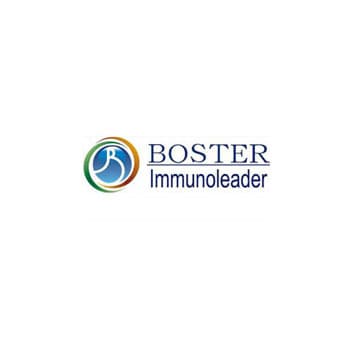
Supplier:
BOSTER IMMUNOLEADERCat no: PA1804
Polyclonal Anti-Paxinllin/PXN
Prices direct from BOSTER IMMUNOLEADER
Quick response times
Exclusive Biosave savings/discounts
SPECIFICATIONS
Price
200.00 USD
Catalog Number
PA1804
Size
100ug/vial
Applications
ICC, IHC, IHC-Fr, WB
Reactivities
Hum, Mouse, Rat
Form
Lyophilized
Format
Each vial contains 5mg BSA, 0.9mg NaCl, 0.2mg Na2HPO4, 0.05mg Thimerosal, 0.05mg NaN3.
Gene Id
PXN
References
1. Fernandez-Valle, C., Tang, Y., Ricard, J., Rodenas-Ruano, A., Taylor, A., Hackler, E., Biggerstaff, J., Iacovelli, J.Paxillin binds schwannomin and regulates its density-dependent localization and effect on cell morphology.Nature Genet. 31: 354-362, 2002.\n2. Salgia, R., Li, J.-L., Lo, S. H., Brunkhorst, B., Kansas, G. S., Sobhany, E. S., Sun, Y., Pisick, E., Hallek, M., Ernst, T., Tantravahi, R., Chen, L. B., Griffin, J. D.Molecular cloning of human paxillin, a focal adhesion protein phosphorylated by P210(BCR/ABL).J. Biol. Chem. 270: 5039-5047, 1995.\n3. Turner, C. E., Glenney, J. R., Jr., Burridge, K.Paxillin: a new vinculin-binding protein present in focal adhesions.J. Cell Biol. 111: 1059-1068, 1990.
Swiss Prot
P49023
Storage Temp
At -20 degree C for one year. After reconstitution, at 4 degree C for one month. It can also be aliquotted and stored frozen at -20 degree C for a longer time.Avoid repeated freezing and thawing.
Additional Info
A synthetic peptide corresponding to a sequence at the C-terminal of human PXN, identical to the related mouse and rat sequences.
Scientific Background
PXN(Paxillin) is a signal transduction adaptor protein discovered in 1990 in the laboratory of Keith Burridge. Salgia et al. (1995) mapped the paxillin gene to 12q24 using fluorescence in situ hybridization.The C-terminal region of paxillin contains four LIM domains that target paxillin to focal adhesions, it is presumed through a direct association with the cytoplasmic tail of beta-integrin. The N-terminal region of paxillin is rich in protein
More from BOSTER IMMUNOLEADER
Applications
IHC, WB
Reactivities
Hum
Applications
IHC, WB
Reactivities
Mouse, Rat
Applications
ELISA, WB
Reactivities
Mouse
Applications
WB
Reactivities
Hum, Mouse, Rat
Applications
IHC, WB
Reactivities
Hum
Latest promotions
Spend less time on DNA cleanup so you can do more science. The MSB Spin PCRapace is the fastest way to purify your DNA from PCR, restriction digestion, and...
New brilliant antibodies, and new lower prices!For flow cytometry reagents in general, \"bright is better.\" The violet-excitable BD Horizon™ BV421 and...
As an incentive to qualify our BSA, we are offering a 20% discount when you purchase your first 100g, 500g or 1000g of any grade of Bovine Serum Albumin....
It is not every day that you are given something for nothing. We are giving away additional spectrophotometer software.Cecil Instruments have enhanced the...
We're so sure that you'll prefer Cayman Assay kits over your present brand that we're willing to give you a free assay kit to prove it!
10% Discount on 2 Rabbit Polyclonal Antibody Service. With over 20 years experience, SDIX has developed into the premier US custom antibody producer,...
For the past decade scientists have extensively used ATS secondary toxin conjugates to make their own targeted toxins for in vitro use.The ability to combine...
Did your supplier increase the price of Fetal Bovine Serum? Did they substitute the US Origin with USDA? Well say no more! Innovative Research is still...
Bulk Cytokines with Custom Vialing.20 - 50% off cytokines, growth factors, chemokines and more...For a limited time Cell Sciences is offering substantial...
Jenway’s 73 series spectrophotometer range provides four models with a narrow spectral bandwidth of 5nm and an absorbance range of –0.3 to 2.5A,...
Are you planning to have a customised antibody made for your research?Since 2000, Everest has been producing a catalog containing thousands of affinity...
Top suppliers
United States Biological
230753 products
Carl Zeiss Microscopy
27 products
Promega Corporation
11 products
Panasonic Healthcare Company
5 products
Life Technologies
1 products
Nikon Instruments Europe
11 products
Olympus Europa Holding GmbH
3 products
Leica Microsystems, Inc.
10 products
GE Healthcare Life Sciences
2 products
Tecan Trading AG
19 products
Beckman Coulter, Inc.
1 products
AB SCIEX
3 products
BD (Becton, Dickinson and Company)
1 products
RANDOX TOXICOLOGY
5 products
Randox Food Diagnostics
6 products


















